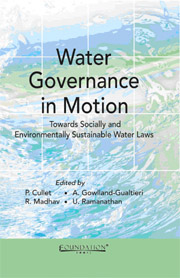Book contents
- Frontmatter
- Contents
- Acknowledgments
- Contributor Biographies
- Introduction
- I Water Law, Policy and Institutional Reforms in India
- 1 Water and Questions of Law: An Overview
- 2 Water Law – Evolving Regulatory Framework
- 3 Discourses in Water and Water Reform in Western India
- 4 The Slow Road to the Private: A Case Study of Neoliberal Water Reforms In Chennai
- II Ongoing Irrigation and Ground Water Reforms in India
- III Perspectives on Privatisation
- IV Environment and Human Rights
- V Comparative Perspectives on Reforms
- Bibliography
2 - Water Law – Evolving Regulatory Framework
from I - Water Law, Policy and Institutional Reforms in India
Published online by Cambridge University Press: 26 October 2011
- Frontmatter
- Contents
- Acknowledgments
- Contributor Biographies
- Introduction
- I Water Law, Policy and Institutional Reforms in India
- 1 Water and Questions of Law: An Overview
- 2 Water Law – Evolving Regulatory Framework
- 3 Discourses in Water and Water Reform in Western India
- 4 The Slow Road to the Private: A Case Study of Neoliberal Water Reforms In Chennai
- II Ongoing Irrigation and Ground Water Reforms in India
- III Perspectives on Privatisation
- IV Environment and Human Rights
- V Comparative Perspectives on Reforms
- Bibliography
Summary
Introduction
In the words of the United Nations Development Programme (UNDP), water is ‘the stuff of life and a basic human right’. Thus, water is an essential element for life - including human life - on earth and as a result is a core concern in law. From a legal perspective, the UNDP rightly emphasises the importance of the human right dimension of water. Yet, in practice, water law is made up of a number of elements comprising a human right dimension, as well as economic, environmental or agricultural aspects. In particular, historically, one of the central concerns of water law has been the development of principles concerning access to and control over water.
Drinking water is directly essential for human life. Water is also indirectly essential, for instance, as an indispensable input in agriculture. Yet, despite the central role that water has always played in sustaining life, human lives and human economies, the development of formal water law has been relatively slow and often patchy. At the domestic level, colonial legislation first focused on the regulation of water for economic reasons, for instance, through the development of legislation concerning irrigation and navigation. Over the past few decades, increasing water pollution and decreasing per capita availability have led to the development of other measures such as water quality regulation and an emphasis on water delivery, particularly in cities, as well as environmentrelated measures. Yet, water law remains largely sectoral till date.
- Type
- Chapter
- Information
- Water Governance in MotionTowards Socially and Environmentally Sustainable Water Laws, pp. 26 - 52Publisher: Foundation BooksPrint publication year: 2010



